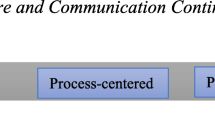This article reports the findings of a qualitative study (secondary analysis) that explored the organizational influences on moral distress for health professionals working in pediatric intensive care units (PICUs) across Canada. Participants were recruited to the study from PICUs across Canada. The PICU is a high-tech, fast-paced, high-pressure environment where caregivers frequently face conflict and ethical tension in the care of critically ill children. A number of themes including relationships with management, organizational structure and processes, workload and resources, and team dynamics were identified. This study provides a rare and important multi-disciplinary perspective on this topic and the findings have implications for administrators and leaders who seek to improve the moral climate of healthcare delivery.
Similar content being viewed by others
References
Austin, W. (2012). Moral distress and the contemporary plight of health professionals. HEC Forum, 24, 27–38.
Bell, J., & Breslin, J. M. (2008). Healthcare provider moral distress as a leadership problem. JONA’s Healthcare Law, Ethics, and Regulation, 10(4), 94–97.
Childs, B. H. (2000). From boardroom to bedside: A comprehensive organizational healthcare ethics. HEC Forum, 12(3), 235–249.
Corley, M. C., Minick, P., Elswick, R. K., & Jacobs, M. (2005). Nurse moral distress and ethical work environment. Nursing Ethics, 12(4), 381–390.
Grob, C., Leng, J., & Gallagher, A. (2012). Educational responses to unethical healthcare practice. Nursing Standard, 26(41), 35–41.
Hall, P. (2005). Interprofessional teamwork: Professional cultures as barriers. Journal of Interprofessional Care, Suppl. 1, 188–196.
Hart, S. E. (2005). Hospital ethical climates and registered nurses’ turnover intentions. Journal of Nursing Scholarship, 37(2), 173–177.
Houston, S., Casanova, M. A., Leveille, M., Schmidt, K. L., Barnes, S. A., Trungale, K. R., & Fine, R. L. (2013). The intensity and frequency of moral distress among different healthcare disciplines. Journal of Clinical Ethics, 24(2), 98–112.
Jameton, A. (1984). Nursing practice: The ethical issues. Englewood Cliffs, NJ: Prentice-Hall.
Kalvemark, S., Hoglund, A. T., Hansson, M. G., Westerholm, P., & Arnetz, B. (2004). Living with conflicts-ethical dilemmas and moral distress in the health care system. Social Science and Medicine, 58(6), 1075–1084.
Lützén, K., & Kvist, B. E. (2012). Moral distress: A comparative analysis of theoretical understandings and inter-related concepts. HEC Forum, 24, 13–25.
Lützén, K., & Schreiber, R. (1998). Moral survival in a nontherapeutic environment. Issues in Mental Health Nursing, 19, 303–315.
Mayan, M. (2009). Essentials of qualitative inquiry. Walnut Creek, CA: Left Coast Press.
McCarthy, J., & Deady, R. (2008). Moral distress reconsidered. Nursing Ethics, 15, 254–262.
Opel, D. J., Wilfond, B. S., Brownstein, D., Diekema, D. S., & Pearlman, R. A. (2009). Characterisation of organisational issues in paediatric clinical ethics consultation: A qualitative study. Journal of Medical Ethics, 35, 477–482.
Pauly, B., Varcoe, C., & Storch, J. (2012). Framing the issues: Moral distress in health care. HEC Forum, 24, 1–11.
Pauly, B., Varcoe, C., Storch, J., & Newton, L. (2009). Registered nurses’ perceptions of moral distress and ethical climate. Nursing Ethics, 16(5), 561–573.
Pentz, R. D. (2000). Core values: An ethics committee’s foray into management theory. HEC Forum, 12(3), 225–234.
Robinson, M., & Cottrell, D. (2005). Health professionals in multi-disciplinary and multi-agency teams: Changing professional practice. Journal of Interprofessional Care, 19(6), 547–560.
Rushton, C. H., Kaszniak, A. W., & Halifax, J. S. (2013). A framework for understanding moral distress among palliative care clinicians. Journal of Palliative Medicine, 16(9), 1074–1079.
Schluter, J., Winch, S., Holzhauser, K., & Henderson, A. (2008). Nurses’ moral sensitivity and hospital ethical climate: A literature review. Nursing Ethics, 15(3), 304–321.
Silverman, H. J. (2000). Organizational ethics in healthcare organizations: Proactively managing the ethical climate to ensure organizational integrity. HEC Forum, 12(3), 202–215.
Storch, J. L., Rodney, P., Pauly, B., Brown, H., & Starzomski, R. (2002). Listening to nurses’ moral voices: Building a quality health care environment. Canadian Journal of Nursing Leadership, 15(4), 7–16.
Storch, J. L., Schick Makaroff, K., Pauly, B., & Newton, L. (2013). Take me to my leader: The importance of ethical leadership among formal nurse leaders. Nursing Ethics, 20(2), 150–157.
Varcoe, C., Doane, G., Pauly, B., Rodney, P., Storch, J. L., Mahoney, K., et al. (2004). Ethical practice in nursing: Working the in-betweens. Journal of Advanced Nursing, 45(3), 316–325.
Varcoe, C., Pauly, B., Storch, J., Newton, L., & Makaroff, K. (2012a). Nurses’ perceptions of and responses to morally distressing situations. Nursing Ethics, 19(4), 1–13.
Varcoe, C., Pauly, B., Webster, G., & Storch, J. (2012b). Moral distress: Tensions as springboards for action. HEC Forum, 24, 51–62.
Wall, S., & Austin, W. (2008). The influence of teams, supervisors and organizations on healthcare practitioners’ abilities to practise ethically. Nursing Leadership, 21(4), 85–99.
Webster, G. C., & Baylis, F. (2000). Moral Residue. In S. B. Rubin & L. Zoloth (Eds.), Margin of error: The ethics of mistakes in the practice of medicine. Hagersstown, MD: University Publishing Company.
Winkler, E. C. (2005). The ethics of policy writing: How should hospitals deal with moral disagreement about controversial medical practices? Journal of Medical Ethics, 31, 559–566.
Wolpe, P. R. (2000). From bedside to boardroom: Sociological shifts and bioethics. HEC Forum, 12(3), 191–201.
Author information
Authors and Affiliations
Corresponding author
Rights and permissions
About this article
Cite this article
Wall, S., Austin, W.J. & Garros, D. Organizational Influences on Health Professionals’ Experiences of Moral Distress in PICUs. HEC Forum 28, 53–67 (2016). https://doi.org/10.1007/s10730-015-9266-8
Published:
Issue Date:
DOI: https://doi.org/10.1007/s10730-015-9266-8




